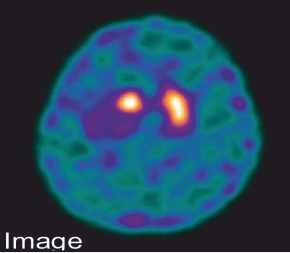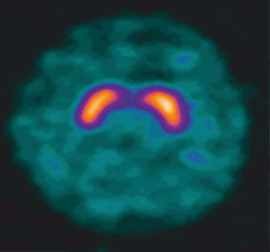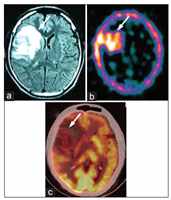- Next to T. B. Hospital Main Gate, Koch’s House, Jerbai Wadia Road, Sewri
NUCLEAR MEDICINE IN NEUROIMAGING
PETCT and TRODAT Scan for Brain
Alzheimer's Disease
Dementia is a complex syndrome affecting areas of cognition, problem-solving, memory amongst many others. Often times there is a significant overlap of clinical presentation of various dementia disorders.
Functional imaging can objectively diagnose, predict and differentiate various dementia disorders at a much higher sensitivity and specificity then conventional imaging. Nuclear medicine offers PET and SPECT imaging technology for the same.
This functional imaging modality is based on the utilisation of caused by the neurons. Areas showing abnormal function show a reduction in glucose utilisation and hence can be seen as an area of hypometabolism on the brain PET imaging.
Since funcåonal changes proceed the development of structural changes, brain PET can pick abnormalities earlier then morphologic abnormalities
Why PET CT in DEMENTIA? Assessment of subjects with clinical Mild Cogni ve Impairment( MCI)-
Amongst the current available imaging modalies FDG brain PET is the most sensive technique for evaluaon of Alzheimer’s disease.
Paent’s clinical MCI progresses to develop frank Alzheimer’s disease while a small subgroup stays stable.
Subjects with clinical MCI and an abnormal abrain PET are 18 mes more likely to develop frank Alzheimer’s disease in due course of me when compared with those subjects with normal Brain PET
PET CT in Other Demena Disorders:
- Diffuse Lewy Body demena
- FrontoTemporal Demena and its subtypes
- CorcoBasal Degeneraon
Movement Disorders: MRI Brain vs TRODAT scan
PET CT + TRODAT scan - Parkinson-Plus Syndrome
Coregistered PET MRI Brain Scan Evaluaon of brain tumors:
Reference DOI: 10.4103/0972-3919.147525
Evaluaon of Refractory Seizures:
Specific ulity of FDG Brain PET in seizures is:
- Idenfy focus when MRI is normal or discordant with EEG findings
- To guide site of invasive subdural electrode placement
- Lateralise and idenfy epileptogenic focus in cases of bilateral abnormalies on MRI
- Infants, where incomplete myelinaon limits evaluaon with MRI imaging
- To exclude contralateral abnormalies in paents being planned for hemispherectomy





